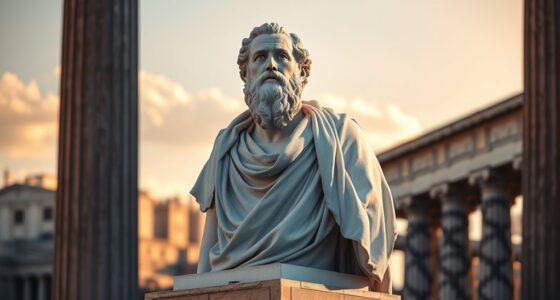Are you ready to explore the wisdom of ancient Greek philosophers? This article will reveal six timeless life lessons that have stood the test of time.
Imagine this: you find yourself at a crossroads, unsure of which path to take. Socrates, the renowned philosopher, would advise you to ‘Know Thyself.’ This powerful lesson emphasizes the importance of self-awareness and understanding one’s own strengths and weaknesses.
As we delve further into the teachings of Plato, Aristotle, Epicurus, Epictetus, and Marcus Aurelius, we will discover their profound insights on pursuing ideals, finding balance, seeking pleasure in simplicity, embracing stoic resilience, and living in the present moment.
So, let’s embark on this journey of enlightenment and uncover ancient wisdom that can guide us towards mastery in life.

Key Takeaways
- Self-awareness is crucial for personal growth and better decision-making.
- Pursuing excellence and wisdom through questioning and self-improvement.
- Finding balance in all aspects of life, including work, relationships, and well-being.
- Achieving moral excellence by balancing virtues and avoiding vices.
Socrates: Know Thyself
We must all strive to truly know ourselves, as Socrates famously emphasized. Self-reflection is an essential practice that allows us to gain a deeper understanding of our thoughts, emotions, and behaviors. It’s through this introspection that we can identify our strengths, weaknesses, and areas for improvement.
Self-awareness, on the other hand, refers to the ability to recognize and understand our own emotions and reactions. By cultivating self-awareness, we can better manage our emotions and make more informed decisions.
The importance of self-reflection can’t be overstated. It allows us to gain insights into our values, beliefs, and motivations, which in turn helps us align our actions with our true selves. Through self-reflection, we can identify patterns and recurring themes in our lives, enabling us to break free from limiting beliefs and behaviors.
The impact of self-awareness extends beyond our individual lives. When we’re self-aware, we become more empathetic and understanding towards others. We’re better equipped to navigate conflicts and build stronger relationships. Self-awareness also plays a vital role in leadership, as it allows us to understand our impact on others and make necessary adjustments to inspire and motivate those around us.

Plato: Pursue the Ideal
To truly embody the teachings of Plato, we must strive to pursue the ideal. Plato believed in the existence of a perfect and unchanging realm of forms, which he considered to be the ultimate reality. He believed that the physical world we perceive is merely a flawed reflection of this ideal realm. In order to live a fulfilling and meaningful life, Plato argued that we should constantly seek to align ourselves with the perfect forms and strive for excellence in all aspects of our existence.
- Pursuing perfection: Plato believed that we should never settle for mediocrity. Instead, we should strive to achieve the highest level of excellence in everything we do.
- Striving for excellence: Plato emphasized the importance of constantly improving ourselves and pushing our limits. He believed that through continuous learning and growth, we can come closer to realizing our full potential.
- Seeking wisdom: Plato believed that true knowledge and wisdom come from understanding the eternal and unchanging truths of the ideal realm. He encouraged us to question everything and engage in philosophical inquiry to gain a deeper understanding of the world.
- Cultivating virtue: Plato believed that the pursuit of the ideal involves cultivating virtues such as justice, courage, and wisdom. By embodying these virtues, we can lead a virtuous and fulfilling life.
- Living a purposeful life: Plato argued that by pursuing the ideal, we can find our true purpose and live a life of meaning and fulfillment.
In our quest to pursue the ideal, we must also recognize the importance of finding balance in all things, as Aristotle will teach us.
Aristotle: Find Balance in All Things
When it comes to Aristotle’s philosophy of finding balance in all things, it becomes evident that he believed in the pursuit of a harmonious existence. By striving for moderation and avoiding extremes, Aristotle argued that individuals could achieve a virtuous life.
This concept of balancing virtues and vices allows us to navigate the complexities of life and make wise choices that lead to personal growth and fulfillment.

Pursuing Harmonious Existence
Achieving a harmonious existence requires finding balance in all aspects of life, as Aristotle emphasized. In our quest for inner peace and harmony, it’s essential to recognize the significance of balance. Here are five key points to consider:
- Balancing work and leisure: Strive for a healthy equilibrium between professional responsibilities and personal enjoyment.
- Balancing relationships: Nurturing both our connections with others and our individuality allows for harmonious interactions.
- Balancing physical and mental well-being: Taking care of our bodies and minds ensures overall wellness.
- Balancing ambition and contentment: Pursue goals and aspirations, but also appreciate and find contentment in the present moment.
- Balancing giving and receiving: Cultivate a reciprocal exchange of kindness and generosity with others.
By acknowledging and embracing these principles, we can attain a state of harmonious existence.
Transitioning into the subsequent section on balancing virtues and vices, let’s explore how Aristotle’s teachings further guide us on this path.
Balancing Virtues and Vices
In our pursuit of a harmonious existence, it is crucial to find balance between virtues and vices, as emphasized by Aristotle. Achieving moral excellence requires us to navigate the delicate line between extremes, finding the middle ground that allows us to cultivate positive qualities while avoiding the pitfalls of excess or deficiency. Aristotle believed that each virtue lies between two vices, one of excess and one of deficiency. For instance, the virtue of courage lies between the vices of recklessness and cowardice. To illustrate this concept further, consider the following table:

| Virtue | Excess | Deficiency |
|---|---|---|
| Courage | Recklessness | Cowardice |
| Generosity | Extravagance | Stinginess |
| Moderation | Gluttony | Abstinence |
| Honesty | Bluntness | Deception |
| Patience | Indifference | Impatience |
Epicurus: Seek Pleasure in Simplicity
By embracing simplicity, we can find pleasure in our daily lives, as advocated by Epicurus, an ancient Greek philosopher. Epicurus believed that true happiness comes from seeking pleasure and avoiding pain. However, he defined pleasure in a different way than most people do.
For Epicurus, pleasure wasn’t about indulging in extravagant or excessive desires. Instead, he argued that true pleasure comes from finding contentment and satisfaction in the simple things in life.
To seek pleasure in simplicity means:
- Embracing a minimalist lifestyle: By decluttering our lives and focusing on what truly matters, we can find joy in the simplicity of our surroundings.
- Cultivating meaningful relationships: Connecting with others on a deeper level and nurturing genuine friendships brings us happiness and fulfillment.
- Appreciating the present moment: Practicing mindfulness and being fully present in each moment allows us to savor the simple pleasures that life offers.
- Taking care of our physical well-being: Eating nutritious food, exercising regularly, and getting enough rest contribute to our overall well-being and enhance our enjoyment of life.
- Practicing gratitude: Being grateful for the small things in life reminds us of the abundance and beauty that surrounds us.
In a world that often values material possessions and constant stimulation, Epicurus’ philosophy serves as a reminder that true pleasure can be found in the simplicity of everyday life. By seeking pleasure in simplicity, we can cultivate a sense of contentment and find lasting happiness.

Epictetus: Embrace Stoic Resilience
When it comes to embracing stoic resilience, there are several important points to consider.
Firstly, adopting a stoic mindset can bring numerous benefits to our lives, such as increased emotional stability and the ability to navigate through difficult situations with more ease.
Secondly, Epictetus teaches us how to overcome adversity by reminding us that we’ve control over our own thoughts and reactions, even when we can’t control external circumstances.
Lastly, the real challenge lies in applying Epictetus’ teachings in our daily lives and integrating stoic resilience into our mindset and actions.

Stoic Mindset Benefits
One key benefit of embracing Stoic resilience, according to Epictetus, is that it allows us to cultivate a sense of inner strength and tranquility. By incorporating Stoic principles in our daily lives, we can experience the following benefits:
- Enhanced emotional well-being: Stoicism teaches us to focus on what’s within our control and let go of what’s not. This mindset helps us to manage our emotions more effectively and maintain a sense of calm amidst life’s challenges.
- Improved decision-making: Stoicism encourages us to approach situations with rationality and logic, enabling us to make more informed choices based on reason rather than emotion.
- Increased resilience: Stoic resilience allows us to bounce back from setbacks and adapt to change more easily, enabling us to navigate adversity with grace and strength.
- Greater self-awareness: Stoicism encourages self-reflection and introspection, helping us to understand ourselves better and develop a stronger sense of self.
- Deeper appreciation of the present moment: Stoicism teaches us to embrace the present moment and find contentment in the here and now, fostering a greater sense of gratitude and fulfillment in our lives.
Embracing Stoic resilience can empower us to overcome adversity with strength and grace, as we’ll explore in the subsequent section.
Overcoming Adversity With Stoicism
To overcome adversity with Stoicism, we can embrace Stoic resilience and cultivate a sense of inner strength and tranquility, as taught by Epictetus. Developing emotional resilience and practicing self-discipline are key aspects of this philosophy. Epictetus believed that we have the power to control our thoughts and emotions, regardless of external circumstances. By acknowledging that some things are within our control and others are not, we can focus our energy on what we can change and accept what we cannot. This mindset allows us to navigate difficult situations with grace and composure.
| Key Principles of Stoicism | |||
|---|---|---|---|
| Focus on what is within your control | Accept the things you cannot change | Cultivate inner strength and tranquility | Embrace adversity as an opportunity for growth |
Applying Epictetus’ Teachings?
We can apply Epictetus’ teachings by embracing Stoic resilience and developing a sense of inner strength and tranquility. The principles of Stoicism can guide us in navigating life’s challenges with grace and equanimity. Here are some ways we can apply Stoic principles in our daily lives:

- Practice acceptance: Embrace the things that are within our control and let go of those that are not.
- Cultivate gratitude: Focus on what we’ve rather than what we lack, and appreciate the present moment.
- Maintain perspective: Recognize that setbacks and obstacles are part of the human experience, and view them as opportunities for growth.
- Practice self-discipline: Develop habits and routines that align with our values and goals.
- Foster resilience: Build mental and emotional resilience by facing adversity head-on and learning from it.
By applying these Stoic principles, we can develop the resilience needed to navigate life’s challenges with a sense of calm and inner strength.
Transitioning into the subsequent section about Marcus Aurelius, we can see how his teachings further emphasize the importance of living in the present moment.
Marcus Aurelius: Live in the Present Moment
Let’s explore the importance of living in the present moment according to Marcus Aurelius, an ancient Greek philosopher. Marcus Aurelius was a Stoic philosopher and the Roman Emperor from 161 to 180 AD. His writings, collected in his book ‘Meditations,’ provide timeless wisdom that can guide us in navigating the complexities of life.
One of the key teachings of Marcus Aurelius is the practice of living in the present moment. He believed that by focusing our attention on the present, we can find peace and contentment. This idea aligns with the benefits of mindfulness, a practice that has gained popularity in recent years. Mindfulness encourages us to be fully present in the here and now, paying attention to our thoughts, emotions, and sensations without judgment.

By living in the present moment, we can also cultivate a sense of gratitude. Marcus Aurelius emphasized the importance of appreciating the simple joys in life and expressing gratitude for them. When we practice gratitude, we shift our focus from what’s lacking to what’s abundant in our lives. This mindset shift can bring about a greater sense of fulfillment and happiness.
Frequently Asked Questions
How Can I Apply the Concept of "Know Thyself" in My Everyday Life?
To apply the concept of ‘know thyself’ in our everyday lives, we must embrace vulnerability and actively seek self-awareness. By exploring our innermost thoughts and emotions, we can gain a deeper understanding of ourselves and make better choices.
What Are Some Practical Ways to Pursue the Ideal in My Personal and Professional Life?
We prioritize cultivating self-awareness and setting clear goals in both our personal and professional lives. By regularly reflecting on our values and aspirations, we can align our actions with our ideals and strive for continuous improvement.
How Can I Find Balance in All Aspects of My Life, Including Work, Relationships, and Personal Growth?
How do we find balance in work, relationships, and personal growth? It requires a thoughtful and analytical approach. By prioritizing and setting boundaries, we can maintain equilibrium and find harmony in all aspects of our lives.

What Are Some Simple Pleasures That I Can Incorporate Into My Daily Routine to Seek Happiness and Fulfillment?
Incorporating mindfulness and practicing gratitude are simple pleasures we can include in our daily routine. By being present in the moment and appreciating the little things, we can seek happiness and fulfillment.
How Can I Develop Stoic Resilience and Apply It to Overcome Challenges and Setbacks in My Life?
We can develop stoic resilience by embracing challenges as opportunities for growth. Building resilience involves cultivating inner strength, maintaining perspective, and adapting to adversity. By applying these principles, we can overcome setbacks and thrive in life.
How Do the Life Lessons From Ancient Greek Philosophers Relate to the Greek Quotes?
The timeless Greek quotes illuminate path hold deeper meanings that resonate with the life lessons taught by ancient Greek philosophers. From Socrates to Aristotle, their wisdom on virtue, friendship, and self-discipline are echoed in the evocative words of Greek quotes. Both offer timeless guidance for living a meaningful and fulfilling life.
Conclusion
In reflecting on the timeless wisdom of ancient Greek philosophers, we’re reminded of the enduring relevance of their teachings. From Socrates’ call to self-awareness, to Marcus Aurelius’ reminder to live in the present moment, these lessons stand the test of time.
As we navigate the complexities of modern life, we can find solace and guidance in the profound insights of these philosophical giants. Let’s embrace their wisdom and embark on a journey of self-discovery and personal growth.










